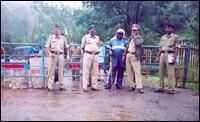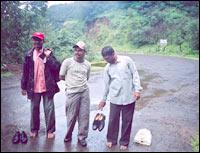Home > News > Specials
The Rediff Special/Vijay Singh
September 16, 2004


Pratapgad is one of Maharashtra's three most historic forts. As long as the Marathas held sway in the region, the fort never fell to the enemy. It was also the site of a famous encounter between Maharashtra's warrior king Chhatrapati Shivaji and the Adilshahi general Afzal Khan in the 17th century.
Sultan Ali Adilshah II of Bijapur had sent his most feared general, Afzal Khan, a giant of a man, to capture Shivaji. The latter realised that he could not take on the Khan's army on the open plains and so took refuge in Pratapgad, from where he harassed the enemy with his guerrilla raids. The Khan tried all possible tricks to lure Shivaji down from his stronghold, including looting villages and destroying temples, but the wily Shivaji did not fall for this.
Realising that the fort could not be breached, Afzal Khan finally agreed to meet Shivaji at the foot of the fort, purportedly to make peace. It proved to be a short, violent meeting. The huge general tried to kill Shivaji, a short man, when the two embraced. But Shivaji proved too clever for him and the Khan ended up losing his own life in the encounter. A tomb marks the site of this dramatic incident.
Since then, Pratapgad has become a popular destination for tourists who admire its impregnable fortifications and are spellbound by the view of the surrounding countryside, especially in and after the monsoon.
Recently, however, the Vishwa Hindu Parishad has been trying to disturb the calm by demanding that Afzal Khan's tomb be demolished because the general was Shivaji's enemy. The agitation is spearheaded by its frontal organisation, the Pratapgad Utsav Samiti.
The outfit gave the state government a deadline of August 31 to demolish the tomb failing which it threatened to get its activists to destroy it on September 12.
The VHP is known to rake up controversial issues in states going to the polls. Assembly elections are scheduled to be held in Maharashtra on October 13.
In the days leading up to September 12, VHP officials made wild claims. "Around 50,000 VHP and Bajrang Dal activists will assemble at Pratapgad on September 12 to protest against the unauthorised construction by the Hazrat Mohammed Afzal Khan Memorial Trust at the fort," regional secretary Vyankatesh Abdeo told the Press Trust of India in Pune on September 10.
"The activists will be empty-handed. But one cannot say anything about the reaction of a mob to a particular situation at a given time," Abdeo warned.
 The threat caused concern among locals and paralysed life in the nearby hill station of Mahabaleshwar, a popular destination for domestic tourists. Unwilling to take any chances, the state government bolstered security around the fort and tomb.
The threat caused concern among locals and paralysed life in the nearby hill station of Mahabaleshwar, a popular destination for domestic tourists. Unwilling to take any chances, the state government bolstered security around the fort and tomb.
The result was that Mahabaleshwar saw few tourists during the September 11-12 weekend. Some scared villagers also left for the homes of relatives to escape any trouble.
But the precautionary measures helped. September 12 passed off without much trouble. But the locals have had enough.
Prabhavati Shetye, deputy chairman of the Mahabaleshwar Municipal Council, said, "Enough is enough. We will not tolerate the VHP anymore. Who are they to make a controversy over this tomb? What they know about it?
Shetye pointed out that Shivaji himself had got the tomb built. "It's a sign of his greatness," she said. "The VHP is simply disturbing our life and business. We have decided to protest against them. The locals may not number much, but we will not allow the VHP to take us for granted."
The VHP, however, says some members of the Hazrat Mohammed Afzal Khan Memorial Trust, which manages the tomb, live in Pakistan. Besides it is unhappy with the state government for allotting forest land to the trust and allowing new construction in the tomb's vicinity. It is believed that the building around the tomb was built after people began leaving gifts at the Khan's grave.
Acting on a petition, the Bombay high court directed that the status quo be maintained at and around the site. In turn, the state government, in August, cancelled the registration of the trust that was taking care of the tomb. It also proposes to convert the illegal structures near the tomb into a museum showcasing Shivaji's life. While most interested parties agreed to the proposal, the VHP first agreed, then backed out.
A source in the district collector's office said, "Some of the trustees went to Pakistan during Partition. And no fresh construction work has taken place close to the tomb. But the VHP wants to create a controversy by misrepresenting facts."
No wonder the VHP failed to attract support from any of the political parties in the state.
The locals are also unhappy with the VHP's insensitivity to their concerns. "The VHP is destroying our life and business," said Krishna Dabhekar, 50. "Nobody from Pratapgad is with them, only outsiders.
"Shivaji himself got the tomb built. He also appointed a Muslim priest to carry out religious rituals. He did this because he believed that enmity ends with the enemy's death. We consider the tomb a sign of his greatness."
The priest performs religious rituals at the tomb, but otherwise there are few Muslim families near the fort. Local people used to visit the tomb during the annual urs (religious event to mark a death or birth anniversary). But this practice was stopped three years ago after the PUS objected. This, of course, did not endear them to the locals.
 "Most of us used to participate in that function," Dabhekar said. "Since a lot of people visited the tomb at that time, the event used to generate good business for us. But now that practice has been stopped. By doing all these things, the VHP is only destroying the livelihood of locals who depend on tourism."
"Most of us used to participate in that function," Dabhekar said. "Since a lot of people visited the tomb at that time, the event used to generate good business for us. But now that practice has been stopped. By doing all these things, the VHP is only destroying the livelihood of locals who depend on tourism."
Tourists used to visit Pratapgad as well as Afzal Khan's tomb. Many villagers had found employment at the tomb. "Shivaji himself allowed construction of the tomb," remarked another villager, Suresh Jadhav. "Now the VHP is trying to create a controversy by spreading misinformation."
The VHP's latest threat led the police to stop movement on the Poladpur-Mahabaleshwar Road, from which a diversion leads to the fort, from September 9. On September 12, they did not allow anyone, including locals, to go anywhere near the tomb.
"We are living in fear for the last few days. Nobody wants to take risks," said Jagdish, who runs a small shop in Wada village, which is where the Poladpur-Mahabaleshwar Road branches off to the fort.
"We want to stop the VHP," Dabhekar added.
Photographs: Vijay Singh | Headline Image: Rahil Shaikh